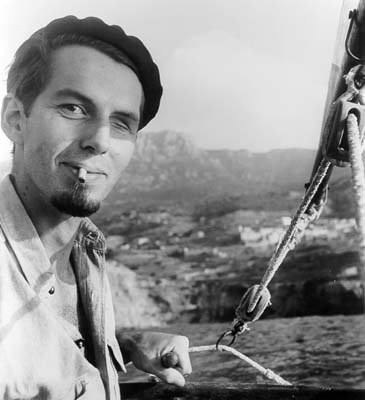正文



和Robert Creeley ____________________________ :之一 不相信自己的眼 --- Oh my God --- you 思想面孔滑稽 --- are a funny face 岁月嘲笑情殇 --- and your smile 熟悉的 --- thoughtful, your teeth 变得陌生 --- sharp --- The agonies 简简单单的生存 --- of simple existence 循规蹈矩的苦痛 --- lifted me up. But 最终兑现成美丽 --- the mirror I looked in 镜子无情 --- now looks back 反问: “你”是 “我”? :之二 --- 我没那意思 Out here there --- 都不敢正眼看一眼 is a soundless float --- 头一回 and the earth --- 甚至没找到 seems far below ---入口 or out. The stars ---‘高处不胜寒’ and the planets --- 下面更孤单 glow on the wall --- 没有了你 inside each other --- 孤独, 孤独 ‘we fuck, we fuck’ ---2004春 附记 [Robert White Creeley] May 21st. 1926, Arlington, Massachusetts — March 30th. 2005, Odessa, Texas Poet, novelist, short-story writer, essayist and editor, Robert Creeley was an originator of the "Black Mountain" school of poetry, along with Charles Olson, Robert Duncan and Denise Levertov. Black Mountain established a new and anti-academic poetic tradition that has been reflected in the work of many poets who have come to occupy significant places in the 20th-century literary canon. Citing Ezra Pound and William Carlos Williams as their literary forebears, these poets developed the theory of "projective verse"-poetry designed to transmit the poet's emotional and intellectual energy directly and spontaneously, depending on natural speech rhythms and lines determined by pauses for breathing. Creeley's frequently-quoted statement, "Form is never more than an extension of content," expresses an important precept of the Black Mountain poets. Creeley is a minimalist poet whose work has been said to reflect with contemporary inarticulateness, "a kind of contemporary stammer...a fear of opening up." His often brief, laconic verses result from his process and his attitude toward poetry. He considers the writing of a poem an effective means of self-discovery and so emphasizes the process of writing over the final result. Contemporary visual art and music were crucial to the formation of his technique. Like abstract expressionism and modern jazz, Creeley's poems are reductive renderings of precise images and emotions, and he employs unusual syntax, punctuation and grammar. He has produced a large body of collaborative works with contemporary artists that include Jim Dine, John Altoon, Robert Indiana, R. B Kitaj and Marisol; musician Irene Aebi, and others. Because his work is intensely self-examining, Creeley has been called a solipsistic poet whose references are often too personal and result in obscurity and narrowness of vision. Nevertheless, critics consider him a significant force in contemporary poetry. His work has generated considerable debate. Since his days as an instructor at Black Mountain College and a founder of the Black Mountain movement, he has been a major influence on younger writers and an important voice in American literature. He co-directs the UB Poetics Program, which he and colleagues Charles Bernstein, Raymond Federman, Leslie Fiedler, Dennis Tedlock and Susan Howe developed to encourage the exploration of language and its capacity to express and represent human experience. Creeley's collected poems (1945-75) were published by the University of California Press in 1982 and represent the work of 30 years from his first collection "Le Fou" (1952) to "Thirty Things." Since 1975, his poetry publications have included "Hello: A Journal," "Later," "Mirrors," "Memory Gardens" and "Windows." His prose was collected and published in 1984 and his collected prose was published by the University of California Press in 1989. He has received a number of prestigious awards, including the Robert Frost Medal from the Poetry Society of America in 1987, the year he was elected to the American Academy and Institute of Arts and Letters. In 1988, he received the Distinguished Fulbright Award to hold the Bicentennial Chair in American Studies at the University of Helsinki, Finland. That year, he also received the Walt Whitman Citation from the New York State Writers' Institute and, in accordance with the citation, was named New York State Poet Laureate for 1989-91. from "Reporter," State Univ. of N.Y.





thanx!
Age
by Robert Creeley
Most explicit--
the sense of trap
as a narrowing
cone one's got
stuck into and
any movement
forward simply
wedges once more--
but where
or quite when,
even with whom,
since now there is no one
quite with you--Quite? Quiet?
English expression: Quait?
Language of singular
impedance? A dance? An
involuntary gesture to
others not there? What's
wrong here? How
reach out to the
other side all
others live on as
now you see the
two doctors, behind
you, in mind's eye,
probe into your anus,
or ass, or bottom,
behind you, the roto-
rooter-like device
sees all up, concludes
"like a worn-out inner tube,"
"old," prose prolapsed, person's
problems won't do, must
cut into, cut out . . .
The world is a round but
diminishing ball, a spherical
ice cube, a dusty
joke, a fading,
faint echo of its
former self but remembers,
sometimes, its past, sees
friends, places, reflections,
talks to itself in a fond,
judgemental murmur,
alone at last.
I stood so close
to you I could have
reached out and
touched you just
as you turned
over and began to
snore not unattractively,
no, never less than
attractively, my love,
my love--but in this
curiously glowing dark, this
finite emptiness, you, you, you
are crucial, hear the
whimpering back of
the talk, the approaching
fears when I may
cease to be me, all
lost or rather lumped
here in a retrograded,
dislocating, imploding
self, a uselessness
talks, even if finally to no one,
talks and talks.